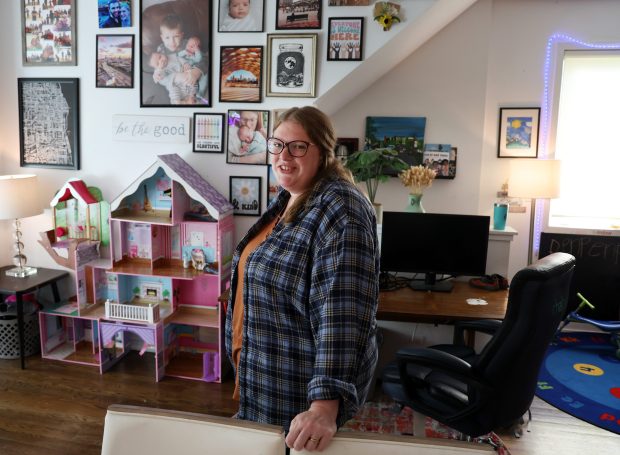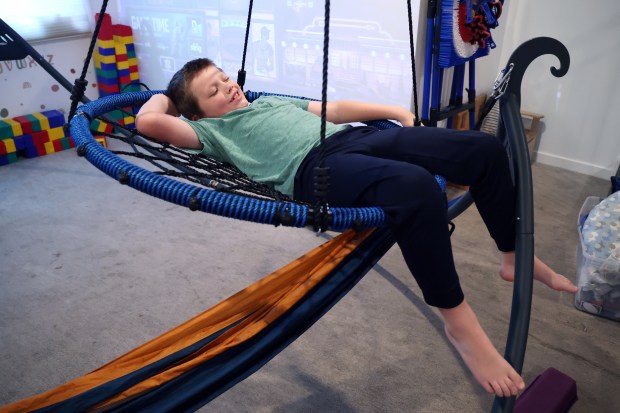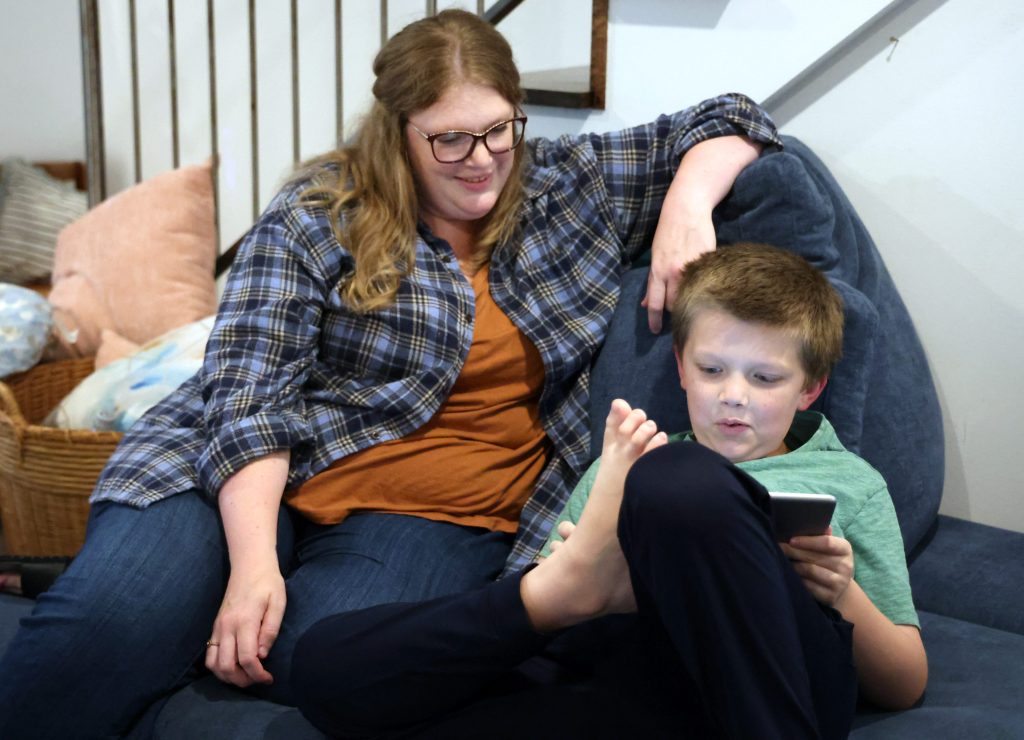Some days, Mollie McGuire wondered if her then 7-year-old son was dying.
The wide-eyed boy, who once raced off to school, came home from class and hid in his room. He barely spoke to his parents. For months, he ate only a handful of select foods and would experience sudden onsets of anxiety, sobbing and gasping for air.
Staff at James Otis Elementary School in West Town struggled to navigate his frequent panic attacks, according to records reviewed by the Tribune.
After her son was repeatedly denied an Individualized Education Plan — a legal document that would provide him access to special education resources — McGuire said she filed a complaint with the U.S. Department of Education’s Office for Civil Rights.
She was scheduled to meet with an OCR attorney in January. Then President Donald Trump was inaugurated, and the meeting never came.
Under the direction of Trump officials, work on complaints effectively ground to a halt. By March, the Department of Education’s civil rights office in Chicago was among seven regional branches abruptly closed — part of a sprawling push to dismantle the agency.
The shutdown was swift, and the fallout staggering. Midwest cases were redirected to the agency’s Denver office, where just over a dozen investigative attorneys were soon stacked with more than 4,200 cases, including hundreds from Illinois, several current and former OCR attorneys told the Tribune.
The mounting caseload has left local parents such as McGuire in limbo, and has strained a complaint system that experts say already suffered from chronic understaffing.
Last month, the Department of Education disclosed plans in a court filing to reinstate OCR attorneys affected by the dismissals. But half a dozen current and former employees told the Tribune they are deeply skeptical that the agency will recover — or that they will be able to continue their work under Trump’s shifting civil rights agenda.
The Department of Education did not respond to multiple requests for comment.
OCR in Illinois
Each year, OCR investigates thousands of discrimination complaints against institutions receiving funds from the Department of Education — including K-12 schools, universities and libraries. If attorneys conclude that a civil rights law was violated, they craft and monitor resolution agreements and can withhold federal funding if schools don’t comply.
The office enforces a number of civil rights laws, and complaints range from sexual harassment to racial discrimination. But roughly a third of pending cases in Illinois are related to disability discrimination, according to a Tribune analysis of OCR’s case database.
“What’s preventing school districts from no longer making accessibility a priority?” asked Frank Lally, an education policy analyst with Access Living, a Chicago disability services nonprofit.
To be sure, OCR was always subject to delays: Investigations can drag on for years. But experts say the process remains a viable path for students seeking resolution — particularly because it allows families to bypass a public, often-costly lawsuit.
Resolution agreements not only mandate corrective action, but also frequently prompt policy reforms in schools, which can drive systemic change, experts said.
Trump’s civil rights overhaul
Trump has long criticized the Department of Education as a stronghold of progressive policymaking. Indeed, for decades, many conservatives have pushed for a reduced federal role in education — though the agency can’t be eliminated without congressional approval. But the president has adopted a radically aggressive approach, tying education reform to his broader crusade against diversity, equity and inclusion initiatives.
For weeks after Trump took office, OCR attorneys were instructed to stop communicating with outside parties. Most investigations came to a standstill, staffers told the Tribune. Attorneys were eventually permitted to resume their work in February, but only in disability discrimination cases, they said.
Those actions culminated in March with a marquee executive order that dismissed more than 1,300 staff across the Department of Education.
More than 260 OCR attorneys were affected, including at least 26 based in Chicago, according to court filings and AFGE Local 252, the union representing agency employees. In addition to the Chicago branch, civil rights offices in Philadelphia, New York City, Dallas, San Francisco, Boston and Cleveland were shuttered.
The Tribune spoke to half a dozen OCR attorneys, all of whom are either currently employed by the Department of Education or left this year. They were granted anonymity due to fears of retaliation. Each described the closures as a profound betrayal of the agency’s founding mission.
“These obligations and rights still exist, but there’s nobody to enforce them,” one former Chicago OCR attorney said. “It sickened me. Absolutely sickened me.”
The agency’s civil rights branch in Denver absorbed the cases from its counterparts in Chicago and Cleveland. But that office had also been hollowed out by staff reductions. Typically, OCR attorneys manage from 30 to 50 complaints at one time. Within weeks, that number had ballooned to more than 300, staff said.
“It created an impossible task,” one former Denver attorney said.
The result was the rapid dismissal of cases. From March 11 to June 27, OCR received 4,833 complaints and dismissed 3,424 “consistent with OCR’s case processing manual,” according to court filings.
Meanwhile, the White House has instructed agency attorneys to prioritize cases involving “illegal DEI” practices in schools. That includes an investigation into Chicago Public Schools’ Black Student Success Plan, an academic achievement program that a complaint has alleged discriminates against students based on race. CPS did not respond to a request for comment.
‘Our only avenue left’
McGuire hasn’t tracked the changes at OCR under Trump. She just wants justice for her now 9-year-old son.
His panic attacks began in October 2022: He’d turn red, clutch his chest and gasp for air in class. When McGuire turned to school staff for help, she was told he needed a medical diagnosis to be evaluated for an IEP, she said. By the time he was formally diagnosed with anxiety, staff claimed it was too late in the year for an evaluation. He would have to wait for second grade.
Even then, McGuire said, the school continued to push back. Meanwhile, her son’s condition worsened. He stopped eating at school. Some mornings, he’d hide in his room and cry, telling his parents he didn’t feel safe in class.
Later, her son was diagnosed with autism by another physician. Still, school officials were skeptical, McGuire said. “The first thing the school psychologist said was, ‘He’s way too smart for an IEP,’” she recalled.
 Mollie McGuire in her Chicago home on Sept. 5, 2025. McGuire’s son experienced anxiety attacks at his former school and was diagnosed with autism, but school officials repeatedly denied him access to an Individualized Education Plan. McGuire filed a complaint with Chicago’s regional Department of Education Office for Civil Rights in 2024. (Terrence Antonio James/Chicago Tribune)
Mollie McGuire in her Chicago home on Sept. 5, 2025. McGuire’s son experienced anxiety attacks at his former school and was diagnosed with autism, but school officials repeatedly denied him access to an Individualized Education Plan. McGuire filed a complaint with Chicago’s regional Department of Education Office for Civil Rights in 2024. (Terrence Antonio James/Chicago Tribune)
The nearly two-year ordeal culminated last summer, when McGuire had to take her son twice to the emergency room for suicidal ideation. He was diagnosed with severe depression and PTSD, with symptoms consistent with abuse and neglect.
Only then did CPS agree to evaluate him. At the citywide Office for Students with Disabilities, staff quickly recognized the need for specialized care, McGuire said. He now attends Rush Therapeutic Day School.
But McGuire had to leave her job as a state prosecutor to care for her son full time. And the family is still thousands of dollars in debt after the evaluations, emergency care and treatment.
In December 2024, she filed the OCR complaint to hold school staff accountable. She was scheduled for an intake call with a Chicago agency attorney on Jan. 24, four days after Trump’s inauguration. But the call was abruptly canceled, and the attorney stopped responding.
“It’s our only avenue left of any type of accountability for what happened to my son,” McGuire said. “And now I’m not counting on it.”
CPS did not respond to a request for comment.
State remedies
In Illinois, there are other avenues for resolving IEP-related disputes. The Illinois State Board of Education offers state-sponsored mediation for special education, allowing families and districts to work with a neutral third party. For a more formal resolution, parents can request a due process hearing — a proceeding typically involving attorneys from both sides that results in a legally binding written decision.
But those processes do not extend to students with Section 504 plans, which are less extensive accommodation documents focused on removing barriers for access. There are also few processes for college students, as well as other forms of discrimination.
Technically, OCR is still up and running. But after the dismantling of the Department of Education, local attorneys are doubtful filing a complaint will lead to meaningful recourse. And school-age children often don’t have time to wait.
“If a kid is being discriminated against today, and the case isn’t addressed for two to four years later, that’s too late to be of any usefulness for the child,” said Matt Cohen, a Chicago special education attorney. “They need help right now.”
 Mollie McGuire’s son spends time in his family’s basement in Chicago after school on Sept. 5, 2025. McGuire said her son is now thriving at his therapeutic day school. (Terrence Antonio James/Chicago Tribune)
Mollie McGuire’s son spends time in his family’s basement in Chicago after school on Sept. 5, 2025. McGuire said her son is now thriving at his therapeutic day school. (Terrence Antonio James/Chicago Tribune)
Other legal experts warn the rollback will only widen educational inequities, particularly when one of the most immediate options for families is litigation.
“You can sue in court, and that’s great if you have an attorney, and you have the money, and you have the time,” said Barbara Cohen, a legal advocate at the Legal Council for Health Justice, a Chicago-based nonprofit. “But the thing that was advantageous about (OCR) is that you as a parent were able to make a complaint without needing a lawyer.”
‘Is this even real?’
The reduction of force at the Department of Education in March prompted several lawsuits from labor unions and advocacy groups, which argued that Trump could not implement a large-scale staff reduction without congressional approval.
Last week, some OCR staffers began to return to active duty, following a federal judge’s order after a national victims’ rights advocacy group filed suit. That process will continue in waves through November.
But all agency attorneys who spoke to the Tribune expressed deep skepticism that OCR can quickly return to its full operational capacity. Logistically, the Chicago branch faces a significant backlog and reduced investigative staff. Resuming work on the heels of a protracted shutdown also poses challenges.
“It’s not like you could just start resolving cases, 1-2-3,” said Judith Levitt, a retired Chicago OCR attorney who served for three decades.
Staff also suspect their work will be curtailed, given the sweeping oversight from the Trump administration. Others wonder if the decision could be abruptly reversed in court. “Our thoughts are, ‘Is this even real?’” said one Chicago OCR attorney.
Meanwhile, thousands of civil rights complaints remain untouched, piled up at offices around the country as they await resolution.
McGuire, for her part, has channeled her anger into a drive for change. She now serves as vice president of the Family Advisory Board at CPS’ Office for Students with Disabilities. Her 9-year-old son is thriving at his therapeutic day school, she said.
But sometimes, her thoughts drift back to the trauma he endured.
In April, she again emailed the Chicago-based attorney initially assigned to the complaint. “I wanted to see if there was an update on the case? I’m not sure if your position was impacted by the recent layoffs (I hope not!)” McGuire wrote.
She hasn’t heard back.
